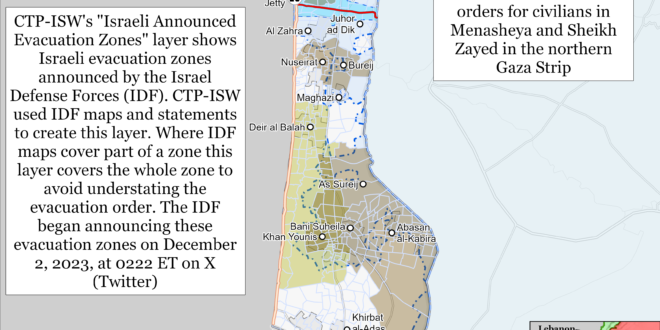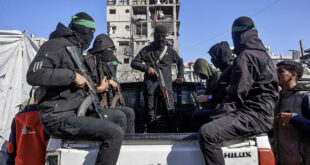The Israeli defense minister publicly called on Israeli Prime Minister Benjamin Netanyahu to define a political end state in the Gaza Strip. Israeli Defense Minister Yoav Gallant said on May 15 that “governance by non-Hamas Palestinian entities, accompanied by international actors, is in Israel’s interest.”[i] Gallant added that he rejected Israeli civil or military governance in the Strip. Gallant said that his statement was necessary because “the gains of the war are being eroded and Israel’s long-term security is at stake.”[ii] Gallant was responding to an earlier statement by Netanyahu in which Netanyahu argued that it would be irrelevant to discuss the post-war plans until Hamas is destroyed.[iii]
This public disagreement between Netanyahu and Gallant comes after IDF Chief of Staff Lt. Gen. Herzi Halevi privately demanded a post-war plan from Netanyahu and called current Israeli re-clearing operations a “Sisyphean task.”[iv] Halevi made these comments during a cabinet meeting sometime between May 10 and 12.[v] The Washington Post reported that Halevi’s private comments reflected the opinions of “many Israeli security officials.”[vi] Other senior IDF officials also demanded ”political leaders…make decisions and formulate a strategy,” according to Israeli media.[vii] Israeli media also reported that Israeli cabinet officials told the prime minister that his failure to make decisions was ”risking lives.”[viii] These disagreements come as the IDF reentered Zaytoun, a neighborhood in southern Gaza City, for the third time since February 2024 and other IDF units began a major, division-sized operation in Jabalia.[ix] The IDF previously fought in Jabalia in December 2023 before withdrawing.[x]
Military action should be designed and executed with a defined political end state to guide military operations and avoid actions that will undermine the successful achievement of the political end state. This is particularly important when the requirement for a military operation’s success is the development and stability of a new government in the area of operations. The political echelon should define a political end state to enable military commanders to design military operations to successfully meet the political end. Military commanders planning operations that lack a political end state will be unable to plan and execute effective operations because the commanders will not understand how their mission fits into the political objective of eliminating Hamas’ government. Destroying Hamas is a military task, but it is not necessarily a political end state without a vision for the post-war Gaza Strip. Some actions that could destroy Hamas’ military capabilities may fail to support the establishment of a new government. Other actions could ultimately undermine Israel’s ability to replace Hamas with a new governing authority in the Gaza Strip. The articulation of a political end state is important to avoid the risks of such outcome.
CTP-ISW continues to assess that there is no sustainable end to this conflict if Hamas remains a political and military entity in the Gaza Strip. Hamas aims to destroy Israel and replace it with an Islamist Palestinian state controlling all Israeli territory. Hamas has said publicly that it can “accept the interim liberation of parts of Palestine” and an “interim truce” but that these interim steps only “serve as a warrior’s rest stop.”[xi] ”Parts of Palestine“ in this context refers to the Gaza Strip. A ceasefire that leaves Hamas in power would serve Hamas’ purposes by allowing the group to prepare for the next round of fighting. Hamas started the current war by breaking a period of relative calm between itself and Israel on October 6, and there is no reason to believe Hamas will honor a future “truce.”
Reuters reported on May 15 that Jordanian security services thwarted an attempt by Iranian-backed militias in Syria to smuggle weapons to a Jordanian Muslim Brotherhood cell in Jordan in late March 2024.[xii] Jordanian security services arrested an unspecified number of Jordanians of Palestinian descent who were “members of the Brotherhood cell” and seized a cache of unspecified smuggled weapons, according to two anonymous Jordanian sources. The Brotherhood cell members intended to use the weapons to conduct “acts of sabotage” to destabilize Jordan, according to the sources. The unspecified Jordanian sources also claimed that the Jordanian Muslim Brotherhood cell is linked to Hamas’ military wing. An anonymous senior Jordanian Muslim Brotherhood representative claimed that senior Hamas leader Saleh al Arouri—who the Israelis killed in January 2024—recruited the arrested cell members.[xiii] Hamas denied on May 15 that it planned to stoke instability in Jordan.[xiv] The Jordanian Muslim Brotherhood acknowledged that Jordanian security forces arrested some of its members and that these members possessed smuggled weapons but claimed that Brotherhood leadership did not approve the smuggling of weapons to Jordan.[xv] It is nonetheless notable that Iranian-backed militias and a senior Hamas leader were able to recruit and then smuggle weapons to a cell in Jordan.
The Iranian-backed attempt to arm a Muslim Brotherhood cell in Jordan supports CTP-ISW’s previous assessments that Iran is adopting a more confrontational approach towards Jordan in its regional strategy.[xvi] Jordan has thwarted numerous attempts in recent months by Iran and its partners to smuggle weapons—including Claymore mines, C4 and Semtex explosives, Kalashnikov rifles, and 107mm Katyusha rockets—to the West Bank and Jordan.[xvii]
Bloomberg reported on May 15 that the International Atomic Energy Agency (IAEA)’s understanding of Iranian “nuclear ambitions” has deteriorated, citing the IAEA Safeguards Implementation Report.[xviii]. The IAEA released the report to diplomats who will attend the IAEA Board of Governors meeting in Vienna on June 3. The report stated that the IAEA’s understanding of Iran’s production and inventory of centrifuges, rotors and bellows, heavy water, and uranium ore concentration has decreased despite an eight percent increase in the number of IAEA inspections in Iran in 2023. IAEA Director General Rafael Grossi stated in the report that there has been little progress in resolving outstanding safeguards issues. Grossi added that the IAEA cannot provide ”assurances about the exclusively peaceful nature of Iran’s nuclear program” unless Iran resolves the outstanding safeguards issues. Iran’s stockpile of 20 percent enriched uranium increased by 145 kilograms in the last quarter.
Grossi separately stated on May 15 that Iranian officials “must stop” normalizing discussions about procuring a nuclear weapon. Some Iranian officials have warned in recent weeks that Iran could change its nuclear doctrine, as CTP-ISW has repeatedly noted.[xix] Grossi stated that Iran must “meaningfully engage” with the IAEA so that the IAEA can guarantee that the Iranian nuclear program is exclusively peaceful in nature.
Key Takeaways:
- Post-War Plan for the Gaza Strip: Senior Israeli officials are publicly disagreeing over a post-war plan for the Gaza Strip. The Israeli defense minister demanded a post-war plan from Prime Minister Netanyahu, and the IDF chief of staff called current Israeli operations a “Sisyphean task” unless a post-war plan is established.
- Military action should be designed and executed with a defined political end state to guide military operations and avoid actions that will undermine the successful achievement of the political end state. Destroying Hamas is a military task, but it is not necessarily a political end state without a vision for the post-war Gaza Strip.
- CTP-ISW continues to assess that there is no sustainable end to this conflict if Hamas remains a political and military entity in the Gaza Strip. A ceasefire that leaves Hamas in power would serve Hamas’ purposes by allowing the group to prepare for the next round of fighting.
- Jordan: Jordanian security services arrested several Jordanians of Palestinian descent and seized a weapons cache that Iranian-backed militias had smuggled from Syria into Jordan with the involvement of the apprehended Jordanians. The Brotherhood cell members reportedly intended to use the weapons to conduct “acts of sabotage” to destabilize Jordan.
- Iran: The International Atomic Energy Agency (IAEA)’s understanding of Iranian “nuclear ambitions” has deteriorated, according to the IAEA Safeguards Implementation Report. The IAEA Director General said that Iranian officials “must stop” normalizing discussions about procuring a nuclear weapon
- Lebanon: The IDF killed a senior Hezbollah field commander in a drone strike in Tyre, southern Lebanon, on May 14.
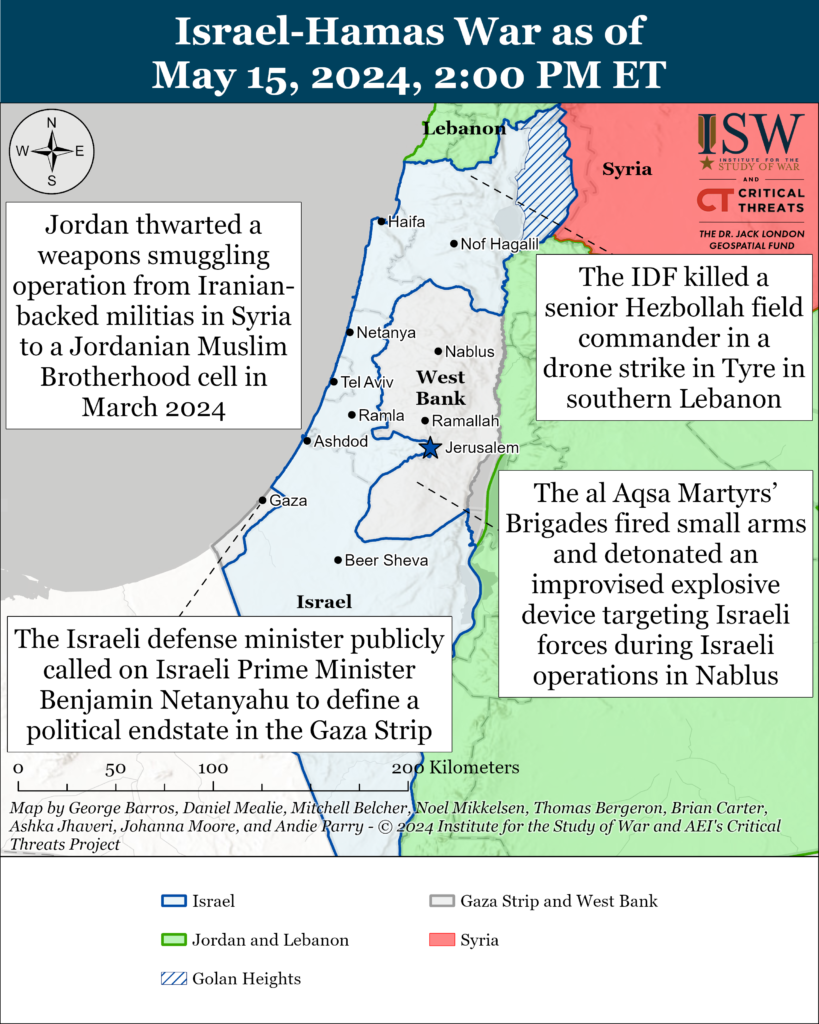
Gaza Strip
Axis of Resistance objectives:
Erode the will of the Israeli political establishment and public to sustain clearing operations in the Gaza Strip
Reestablish Hamas as the governing authority in the Gaza Strip
The IDF 98th Division continued clearing operations in the center of Jabalia camp on May 15. Israeli forces engaged “dozens” of Palestinian fighters while operating in Jabalia.[xx] Palestinian militias have claimed 34 attacks targeting Israeli forces operating near Jabalia camp since CTP-ISW’s last data cutoff on May 14.[xxi] Palestinian militias have claimed 120 attacks (averaging 30 attacks per day) targeting Israeli forces since the IDF advanced into eastern Jabalia on May 11.[xxii] This marks the highest rate of claimed attacks per day in Jabalia since the war began.
Israeli forces continued a re-clearing operation in Zaytoun on May 15. The Nahal Brigade killed Palestinian fighters and seized small arms, explosives, and Hamas intelligence documents.[xxiii] Hamas fighters targeted Israeli forces in Zaytoun with rocket-propelled grenade (RPG) fire.[xxiv] Israeli forces also located a rocket manufacturing facility near a school in Zaytoun.[xxv] The Nahal Brigade withdrew from Zaytoun on May 15 and began preparing for future ”offensive operations.”[xxvi] The 2nd Reservist Infantry Brigade will remain in Zaytoun and continue clearing operations.
The IDF 162nd Division continued clearing operations east of Rafah city on May 15.[xxvii] Palestinian militias, including Hamas, targeted Israeli forces east of Rafah city with RPGs, sniper rifles, and improvised explosive devices.[xxviii] Three Palestinian militias also mortared Israeli forces near Rafah crossing and in eastern Rafah.[xxix] Israeli forces destroyed militia infrastructure.[xxx]
The Givati Brigade (162nd Division) raided a Hamas training facility in Rafah.[xxxi] The training facility contained models of Israeli Merkava tanks and armored personnel carriers. Israeli forces killed Palestinian fighters, seized weapons and intelligence material, and destroyed buildings.
The Israel Defense Forces (IDF) posted footage on May 14 showing unspecified armed Palestinian fighters near an UNRWA logistics facility in eastern Rafah.[xxxii] The Palestinian fighters were loitering near UN vehicles and moving outside the building. The footage also appears to show the Palestinian fighters threatening unspecified individuals at the facility. The IDF also reported that the Palestinian fighters fired small arms.[xxxiii] The IDF called on the United Nations to conduct an investigation into the incident.[xxxiv]
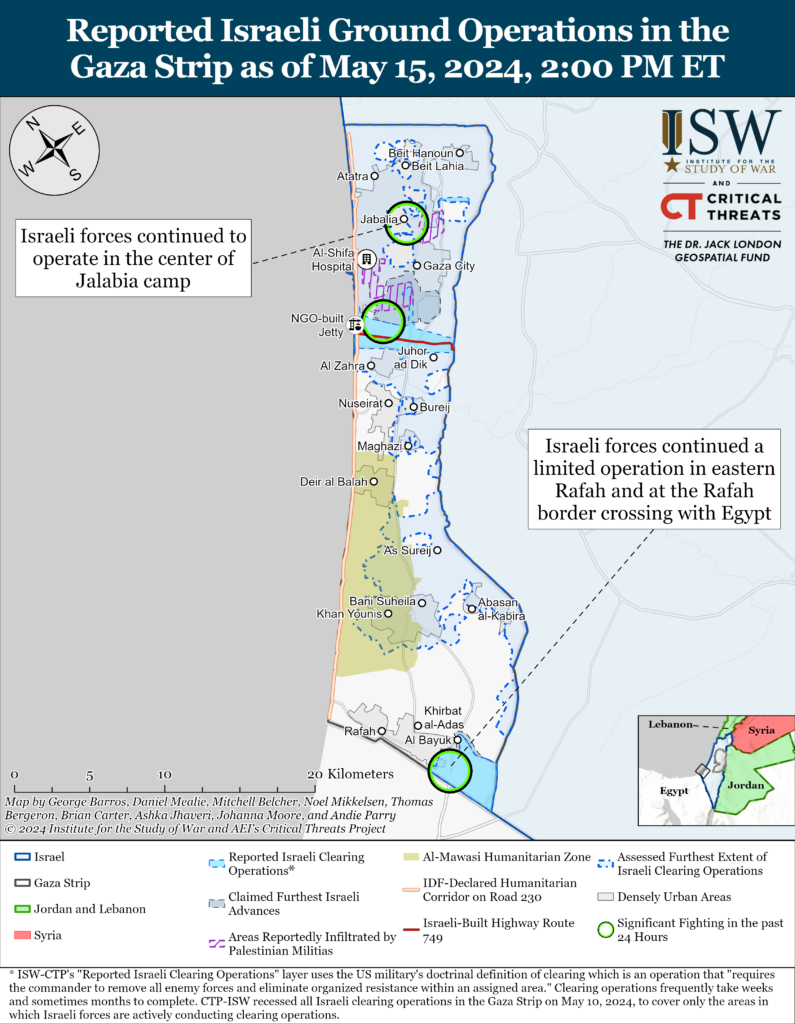
The IDF issued evacuation orders on May 15 for civilians in Menasheya and Sheikh Zayed in the northern Gaza Strip.[xxxv] Israeli forces will conduct operations in the evacuation zones ”immediately” to target Palestinian fighters operating in and launching rockets from the area. The IDF ordered civilians to evacuate to shelters in western Gaza City.
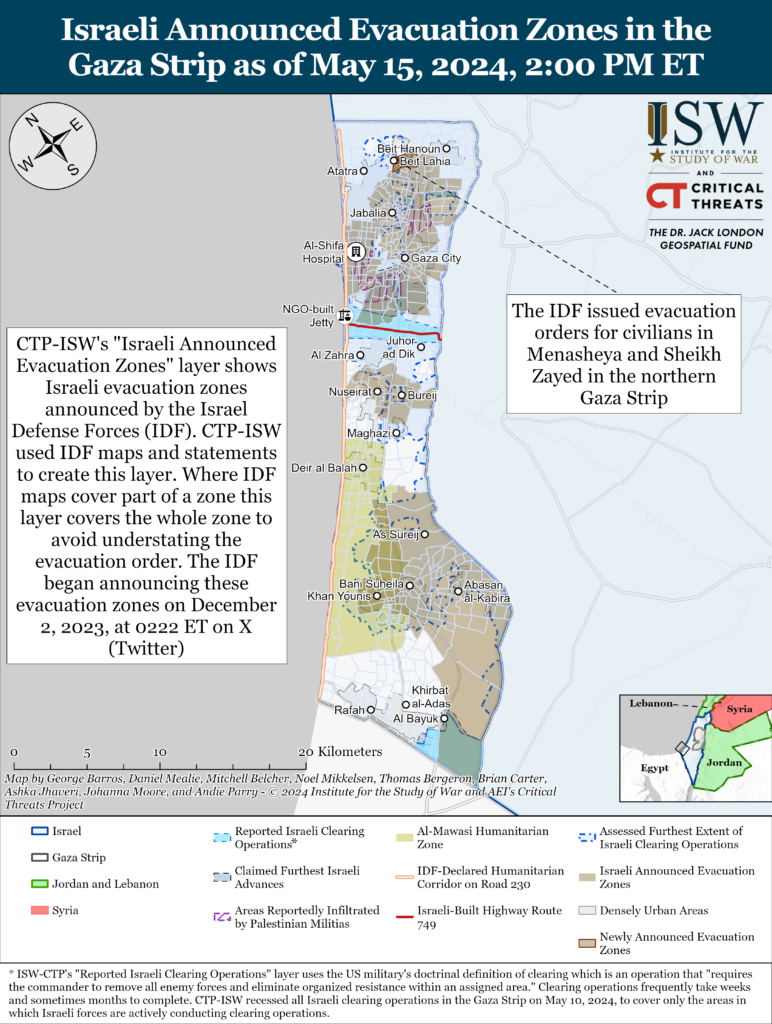
The IDF released documents describing the activities of Hamas’ General Security Service in the Gaza Strip.[xxxvi] The IDF obtained documents detailing the names of operatives working for Hamas’ General Security Service, their handlers, and the reports that the operatives and handlers submitted to the service. The IDF explained that the head of Hamas in the Gaza Strip Yahya Sinwar and a Hamas Political Bureau member, Rawhi Mushtaha, helped established the General Security Service to secure Hamas’ control over the Gaza Strip. The IDF said that Hamas recruited informants in Gazan mosques and elsewhere in communities to report activities that challenge Hamas The IDF added that Hamas also planted “agents” within other Palestinian militias, including PIJ, to interfere in their internal affairs. The IDF reported that the General Security Service has also threatened journalists and human rights activists who speak out against Hamas.
Palestinian fighters conducted at least five rocket attacks from the Gaza Strip into southern Israel since CTP-ISW’s last data cut off on May 14.[xxxvii] The IDF Air Force attacked Palestinian Islamic Jihad (PIJ) fighters who launched a rocket attack from the northern Gaza Strip targeting Sderot on May 14[xxxviii]
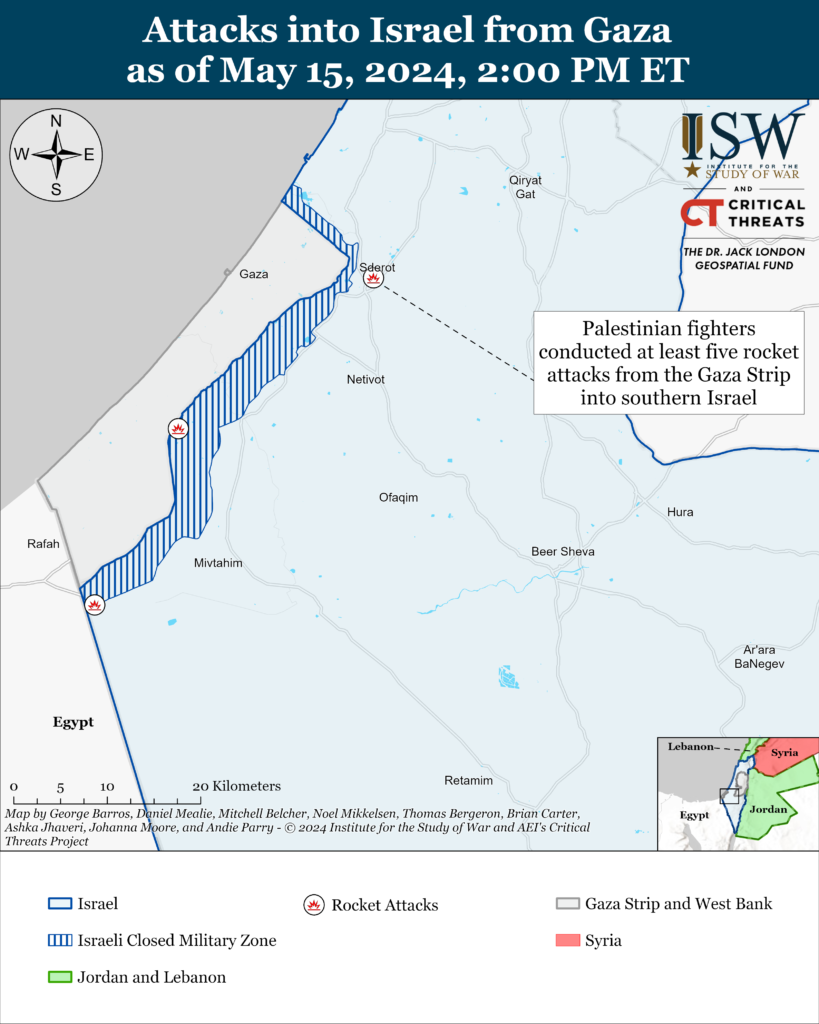
Recorded reports of attacks; CTP-ISW cannot independently verify impact.
West Bank
Axis of Resistance objectives:
Establish the West Bank as a viable front against Israel
The al Aqsa Martyrs’ Brigades fired small arms and detonated an improvised explosive device targeting Israeli forces during Israeli operations in Nablus on May 15.[xxxix]
The Palestinian Authority claimed that Israeli forces shot and killed a student during a march for Nakba Day in al Bireh, near Ramallah, on May 15.[xl] Palestinian media reported that West Bank residents held a funeral service for the student.[xli] The IDF has not commented on the incident at the time of this writing.
Israeli forces detained ten wanted individuals and confiscated military equipment during raids across the West Bank on May 15.[xlii]
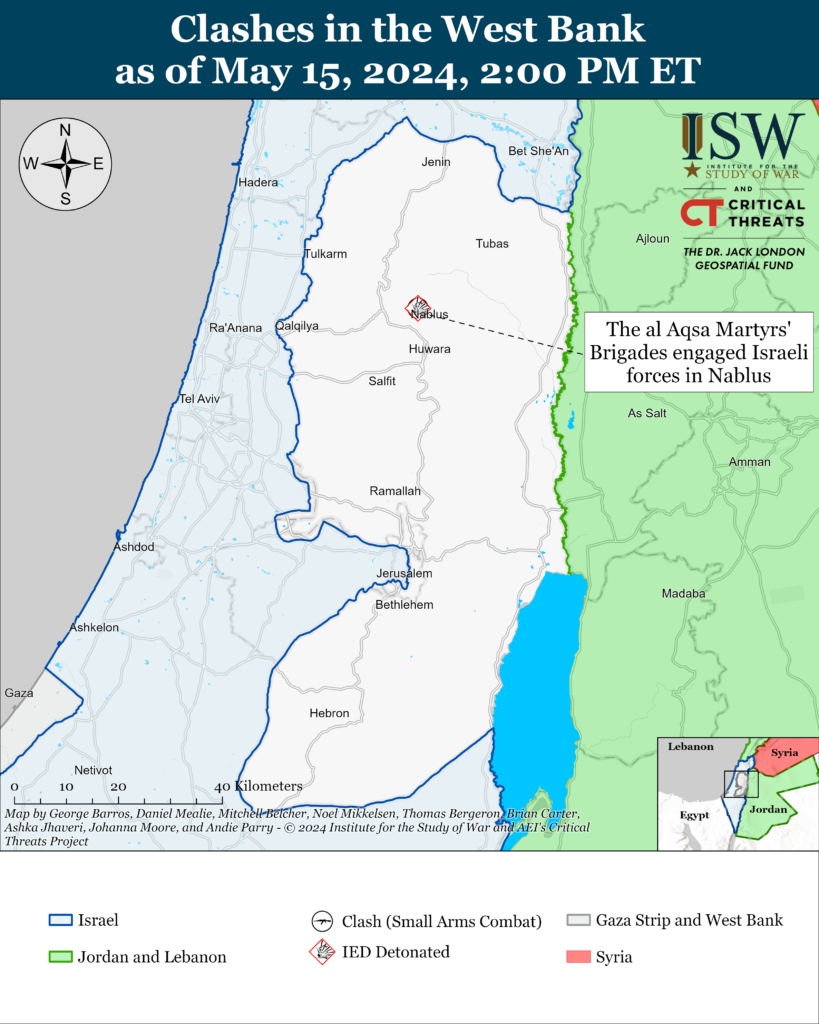
This map is not an exhaustive depiction of clashes and demonstrations in the West Bank.
Southern Lebanon and Golan Heights
Axis of Resistance objectives:
Deter Israel from conducting a ground operation into Lebanon
Prepare for an expanded and protracted conflict with Israel in the near term
Expel the United States from Syria
Iranian-backed militias, including Lebanese Hezbollah, have conducted at least six attacks into northern Israel since CTP-ISW’s last data cutoff on May 14.[xliii]
The IDF killed a senior Hezbollah field commander in a drone strike in Tyre, southern Lebanon, on May 14.[xliv] The IDF said that Hussein Ibrahim al Makki helped plan and execute attacks targeting Israel. The IDF added that Makki previously served as the commander of Hezbollah’s “coastal sector.”[xlv] Hezbollah mourned the death of Makki on May 14.[xlvi] Israeli sources reported that Makki served as a coordinator and liaison between Hezbollah and the IRGC Quds Force in Syria and had a ”special relationship” with senior IRGC officer Brig. Gen. Mohammad Reza Zahedi.[xlvii] Zahedi, who died in the Israeli airstrike in Damascus, Syria, on April 1, commanded the IRGC Quds Force unit responsible for overseeing operations in Lebanon, Jordan, Syria, and the Palestinian Territories.[xlviii] Israeli media said that Makki was responsible for ”arming and equipping [Hezbollah] and the supply line from Iran,” citing unspecified media sources.[xlix] Israeli media added that Makki was a ”strong arm” in Syria for Lebanese Hezbollah Secretary General Hassan Nasrallah.[l]
Lebanese Hezbollah Secretary General Hassan Nasrallah hosted a Hamas delegation in Beirut on May 15.[li] Deputy Hamas leader in the Gaza Strip Khalil al Hayya led the delegation.[lii] Hamas Political Bureau member Mohammed Nasr and Hamas’ senior representative to Lebanon Osama Hamdan also attended the meeting. Nasrallah and the Hamas officials discussed recent developments in the Gaza Strip, the “various support fronts,” and the status of recent negotiations between Israel and Hamas.[liii]
The Metulla Council head said on May 15 that communities in northern Israel will permanently relocate if schools remain closed for another year.[liv] The council head’s comments follow demonstrations on May 14 against the Israeli government’s inability to return displaced Israeli civilians to northern Israel.[lv] Residents began planning protests after Israeli media reported on May 10 that Israeli Prime Minister Benjamin Netanyahu had dismissed concerns that residents may not be able to return to northern Israel before the school year begins in early September.[lvi]
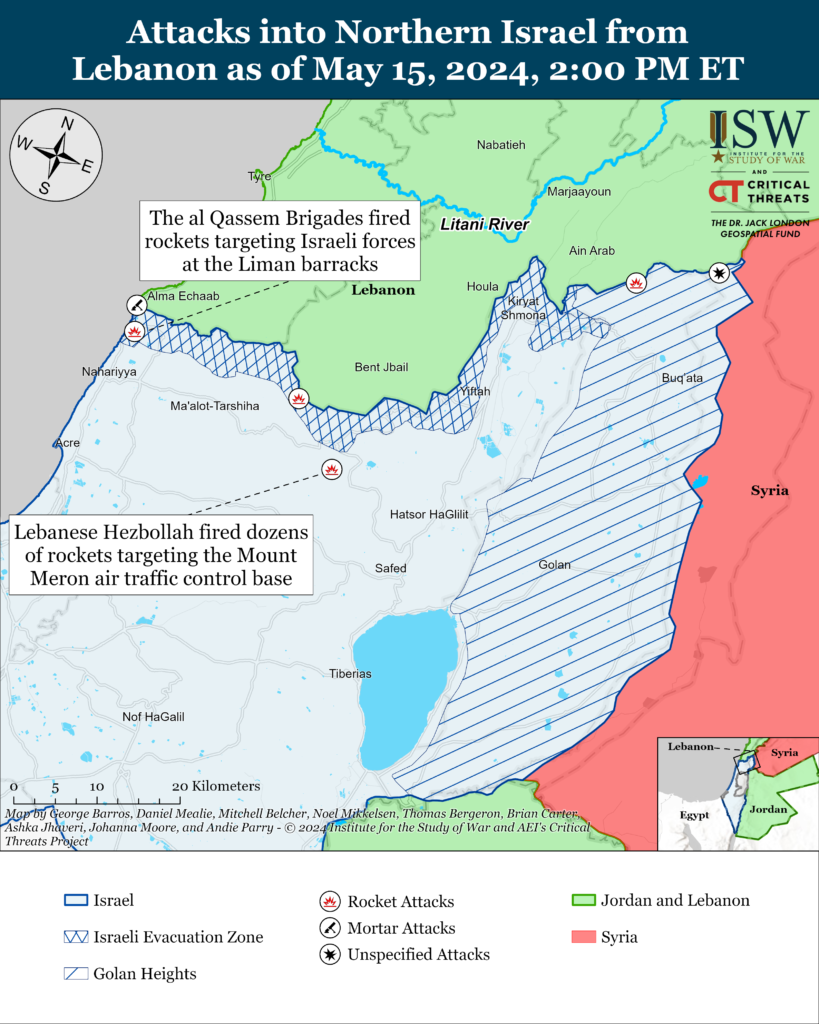
Recorded reports of attacks; CTP-ISW cannot independently verify impact.
Iran and Axis of Resistance
Iranian officials are unapologetically defending the type of violent behavior against Iranian women that triggered the Mahsa Amini protest movement in September 2022. Social media users circulated a video on May 14 of the Iranian morality patrol forcing a woman who defied the mandatory veiling law into a van in Iran.[lvii] The video shows the morality patrol covering the woman’s head with a blanket. Iranian Interior Minister Ahmad Vahidi claimed on May 15 that the morality patrol acted ”according to regulations” by covering the woman’s head with a blanket. This incident follows a sharp increase in violent arrests of unveiled women by the Iranian Law Enforcement Command (LEC) following the resumption of enforced mandatory veiling in Iran in mid-April 2024.[lviii] The LEC separately fired an officer for assaulting an unveiled woman on May 14.[lix] The LEC fired this officer after footage of the LEC acting inappropriately surfaced on social media.
Iranian Law Enforcement Commander Brig. Gen. Ahmad Reza Radan and Vietnamese Public Security Minister To Lam signed a memorandum of understanding in Hanoi, Vietnam, on May 14 to increase law enforcement cooperation.[lx] The agreement includes provisions for Iran and Vietnam to increase information sharing and cooperation to combat organized crime, terrorism, cybercrime, drug smuggling, arms trafficking, and illegal immigration. Radan traveled to Hanoi on May 13 for a four-day visit. Vietnamese Prime Minister Pham Minh Chinh called for increasing economic, commercial, law enforcement, and educational cooperation during a meeting with Radan on May 13. Radan previously traveled to Russia in June 2023 and to China in January 2024.[lxi]
Islamic Revolutionary Guards Corps (IRGC) Quds Force Commander Brig. Gen. Esmail Ghaani reiterated the Iranian regime’s claim that Iran’s April 13 drone and missile attack targeting Israel was a success.[lxii] Ghaani emphasized Iran’s military during a speech on May 15 commemorating former IRGC Quds Force Coordination Deputy Brig. Gen. Mohammad Hadi Haj Rahimi. Rahimi died in the Israeli airstrike in Damascus, Syria, on April 1. Ghaani claimed that Israel, the United States, and the West are “too small” to face Iran and its Axis of Resistance. Ghaani stated that Israel and the United States knew when Iran would launch its retaliatory attack against Israel. This statement is consistent with IRGC Quds Force Coordination Deputy Brig. Gen. Eraj Masjedi’s statement on May 14. Masjedi noted that it is difficult for Iran to maintain the element of surprise when attacking Israel directly due to the distance between the two countries.[lxiii] Ghaani threatened that the full effects of both the April 13 attack and Hamas’ October 7 attack on Israel have not yet been fully seen.[lxiv] Ghaani claimed the success of the April 13 attack is not due to the volume of missiles Iran launched but due to “many secrets” hidden in this operation. Ghaani claimed that the United States defends Israel more than any other country.
The Islamic Resistance in Iraq—a coalition of Iranian-backed Iraqi militias—has claimed three attacks targeting Israel since CTP-ISW’s last data cut-off on May 14. The Islamic Resistance in Iraq claimed a drone attack targeting an unspecified “military target” in Eilat on May 14.[lxv] The group also claimed two “Arqab” cruise missile attacks targeting unspecified “vital targets” in the Jericho Valley and the Nevatim airbase near Beer Sheva on May 15.[lxvi] The IDF reported that its fighter jets intercepted two drones that entered Israeli airspace from the east on the night of May 14 to 15.[lxvii]
Russian state-owned energy company Gazprom announced on May 15 that its CEO, Alexei Miller, met with Iranian First Vice President Mohammad Mokhber and Oil Minister Javad Owji in Tehran.[lxviii] Gazprom did not specify what these officials discussed, and Iranian media has not reported on Miller’s visit to Iran at the time of this writing. Owji met with representatives from Gazprom on the sidelines of the Gas Exporting Countries Forum in Algiers, Algeria, in early March 2024.[lxix] The National Iranian Oil Company and Gazprom signed a memorandum of understanding in July 2022 that includes provisions for Gazprom to help Iran develop the Kish and North Pars gas fields and to increase gas pressure at the South Pars gas field.[lxx]
The Houthis claimed on May 15 that they launched an anti-ship ballistic missile targeting the USS Mason in the Red Sea on an unspecified date.[lxxi] CENTCOM reported that the USS Mason intercepted a Houthi anti-ship ballistic missile on May 13.[lxxii] The Houthis also claimed on May 15 that they fired unspecified weapons targeting a vessel identified as the Destiny in the Red Sea.[lxxiii] The Houthis claimed that the Destiny concealed its destination while transiting via the Red Sea en route to Eilat in April 2024 to avoid a Houthi attack. [lxxiv]
 Eurasia Press & News
Eurasia Press & News
